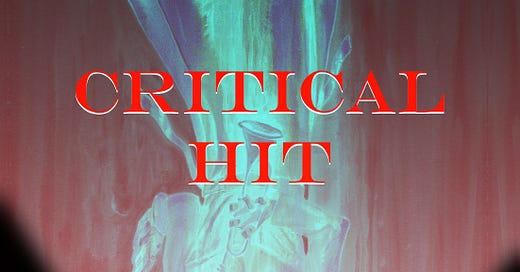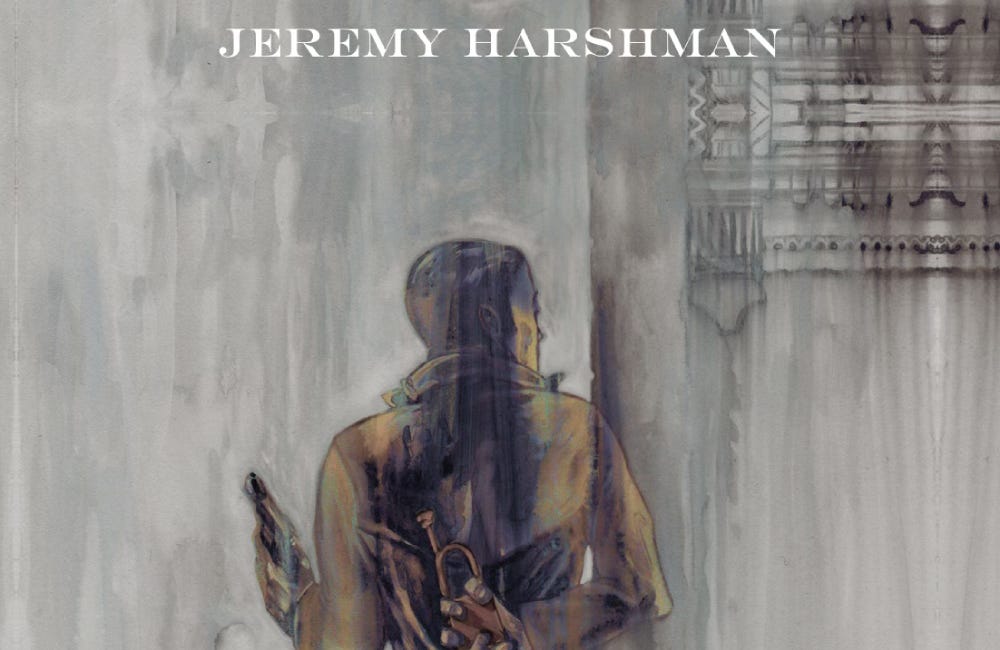When I asked
whether it was alright if I published his critique of Becoming P.T. Lyfantod, what he said to me was:“Aren’t you afraid it will stop people from reading it?”
And honestly, the answer is no. Let me explain.
First, I’m not sure there’s such thing as bad publicity. The more people that are aware of the story, the bigger the pool of potential readers.
And second, because I did a lot of things in this story that are likely to discourage readers of the early chapters coming in cold.
I worked on this story for probably over three years, and it’s the longest, most complex thing I’ve ever written. I went in with a lot of ambition and I broke some common rules. Knowingly. Willingly. They’re rules for a reason, but I did it anyway.
Here’s the thing. I think it’s a great story. It’s not going to be for everyone, but I think there will be people who enjoy it, and for those people, the things I did early on that make the story harder to start with will make it richer, better in the long run.
This story has been queried and rejected by essentially all of the agents in traditional publishing that rep fantasy. I think the way I started the story has probably got a lot to do with why. But maybe that just means that the traditional publishing model is resistant to challenging works.
Some of What I Did
Way back in time, when this story was but a twinkle in my eye, I learned of a fun storytelling concept: the frame narrative. If you’ve enjoyed The Princess Bride or The NeverEnding Story, you’ve experienced one. It’s a story within a story, and I think it’s great. The danger lies in the execution.
When you write a book, you’re making a pact with the reader: trust me with your time, and I’ll deliver you something worthwhile. Now depending on your reputation, you may have a lot of trust. Readers may open your book, find it weird, but if you’re known and respected, they may give you the benefit of the doubt. If you’re a nobody like me, however, at the first sign of trouble, they may run. Or, as Joshua so aptly put it, throw your book at a wall.
To be fair, I did it twice.
And that’s not all I did. The book is quirky, I’ll admit it, but I think it’s worth your time. If you can read this critique and still think it’s worth giving a try, I’ll have won.
Why I’m Publishing the Critique
Even if it doesn’t inspire you to read my book, I think publishing this critique is going to be worthwhile.
First, the selfish reasons. As writers, we need to develop thick skins. I could have taken this critique and wallowed over it. But as the Navy SEALS say: FULL BENEFIT. Publishing it online for anyone to read robs it of its power to hurt my feelings. In every adversity, there is opportunity.
Second, I think it really is a solid critique, delivered in good faith with the aim of making my writing better, or at least making me aware of its shortcomings. I really appreciated that. I told Joshua and I meant it that you can pay an editor and not get as thorough or honest a critique as this.
If this inspires other writers and readers and editors to higher quality critiques, I’d be pretty happy about that.
So here it is, the critique.
The critique, in full:
Hi Jeremy,
I've been stealing time where I can to revisit Becoming P.T. Lyfantod. I've reached part 5: Tom Firth has shown up and I'm hearing about him. Honestly, Jeremy, I'm not sure that I'll continue with this story. It's yet to win me over. In some ways, the further I go, the more perplexed I get.
I think I owe you a thorough critique. Let me warn you, I'm going to be brutally honest. That's my style in critique. Rather than dance around what I think you need to hear, I come out and say it plain. So, as we've discussed before, put on your thick skin.
I'll start with the positives:
INTRIGUING FIRST PART. Three characters in a tight spot with no apparent way out. Good hook.
STYLE. Your style is plain, direct, and accessible. Reading it, I had nits about this little thing and that, a word choice here and there, but nothing got in my face and created a real problem.
STORY COHESION (within a given part). One by one, the parts feel pretty "tight," well thought-out. Except for one moment (in the inn, when the characters were rushing outside to find out what had happened to Argon), I never struggled to keep track of what was happening in-scene.
Now, the problems I encountered: TOO MANY NEEDLESSLY UNANSWERED QUESTIONS.
How did the three characters in part 1 get into that fix? How did they end up together in it? I never got a clear picture of this. You dropped in some imagery and a reference to another character (if I recall correctly) alluding to prior events, but all in all those events stayed fuzzy. I assume the first-person POV in part 1 is P.T. Lyfantod, but I don't believe it's spelled out, so I don't know for sure who I'm hearing from. Why does P.T. (?) start telling a long, drawn-out story to the other two characters? Why is this his method for addressing their predicament, and why does he believe it'll help?
Why aren't any of these questions answered for the reader? If there are reasons, I can't tell.
STORY COHESION (across multiple parts). At the outset of part 2, because P.T. starts telling a story to the other two characters, we're yanked out of the part 1 setting and predicament, and we're taken down a rabbit hole with a different story. At the end of part 4, we're yanked out of *that* story and into yet another. At the start of part 5, we briefly return to the three characters we met in part 1, but in this interlude nothing advances plot-wise about their situation and we learn no more about the characters than we'd already learned in part 1. The more I read other stories and meet new characters far afield from the first three characters I met, the more I float away from them, forget what I know about them, lose track of what their situation is – and the less I care about them or what happens to them.
BOREDOM. I think stepping away from the three characters and the predicament they're in, as established in part 1, is a big narrative misstep. The deeper I went into parts 2 - 4, the more I thought to myself, "This reads just like an RPG, like a D&D campaign – stock characters, stock settings, predictable story." I quickly grew bored. The more bored I grew, the harder I had to work to keep reading.
This isn't how you want a reader to react. Especially early on, you should want to impress the reader with your originality, with characters, settings, and story that are anything but "stock."
If possible, you should also sprinkle in "productive mysteries" – carefully chosen unanswered questions which intrigue the reader and make them want to keep reading in order to get the answers. And of course it follows that, having made a promise to your reader that they'll get said answers, you've got to fulfill the promise, deliver those answers at some point. This is why I was so bothered by the needlessly unanswered questions mentioned above. They distract me from other potential unanswered questions, so I can't tell what your productive mysteries are and I don't know what I'm reading in the hope of getting answers to.
"IT WAS ALL A DREAM!" At the end of part 4, the rabbit hole of the second story collapses and we discover it was an RPG. In part 5, we head off in a new direction with a third story. Now, I have yet more characters to meet and get to know. What their campaign in the town of Wrath and on the island told me about them is pretty thin, and I've got to try to "map" the RPG stock characters onto the personalities of the new characters, which is just confusing. But here's the most frustrating thing: I'm left shaking my head and wondering why you even wrote parts 2 - 4. This is like a story that ends with the line: "Then John woke up. It was all a dream!" *SIGH* If it was all a dream, if the events narrated don't actually matter to John's life, what was the point of narrating them? In your story, when I'm yanked out of the narration of parts 2 - 4, what sign do I get that those parts' events really matter, beyond the new characters' exasperation with Tom Firth over ruining their game? Why did I have to read parts 2 - 4 at all?
If for some reason you had to take me through this fake-out, couldn't you have condensed the events and character descriptions of parts 2 and 3 in just a few paragraphs of summary, begun the story on the island, moved quickly into action as the characters are attacked by ghosts and zombies, and had Tom Firth interrupt and ruin the game – all in one part, not three?
See, this is why, sitting in the middle of part 5, I now hesitate to read on. First, I've been "faked out" by the narrator, giving me reason not to trust him – in a story where I've got no reason to expect that, no reason to think he is or ought to be an unreliable narrator. Secondly, I feel a lot of my time has been wasted by story that doesn't matter. (At least, if it does, that's not hinted.) Frankly, these are the sorts of things that have made me hurl books against the wall.
Now, maybe if I read on, I'll discover that you redeem all this, that you make parts 2 - 4 matter, that P.T. "faked out" his companions (and me) for good reason, that he's telling these stories far afield from the part 1 scenario with a solid purpose – that there's method to the madness. But at this point in the story, you're asking your reader to take all of that on faith. Have you earned the reader's faith? Just how far can you go with breaking expectations before you have to start fulfilling them? How far can you push it before the reader thinks, "Nah, I'm checking out"?
I know firsthand that such a critique as this – light on the positives, heavy on the problems – is hard news. It took me some time today to think it out and write it, so I hope you see it's meant constructively, to help you steer clear of pitfalls in a future book, not to sting.
If you appreciated that review, be sure to pop over to Joshua’s page and give his work a look. It’s worth it.
Now if that didn’t put you off reading it, nothing will. And the good news? It’s all uphill from there. Or is it downhill? Whichever is the good one regarding stories.
Becoming P.T. Lyfantod - start here
Becoming P.T. Lyfantod is a serial novel posted twice each week.










I think I disagree with this review. I’ve done nothing but enjoy the series. Now what you need is a scandal